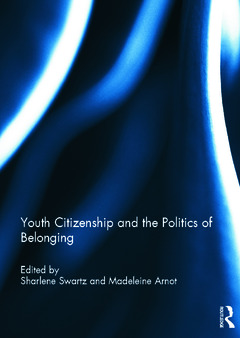Description
Youth Citizenship and the Politics of Belonging
Coordinators: Swartz Sharlene, Arnot Madeleine
Language: English
Subject for Youth Citizenship and the Politics of Belonging:
Keywords
Comparative Education; youth citizenship; youth marginalisation; youth politics; youth agency; citizenship education; gendered citizenship; civic education; nationalism; youth poverty; global citizenship; Madeleine Arnot; Young Men; Sharlene Swartz; PLA Activity; CCEA; UK Riot; UN; UNRWA School; South African Collective; Female Street Youth; UNRWA; PLA; Wider Issues; Nation Building; Palestinian Young People; South Lebanon; Palestinian Youth; Jordanian Youth; Palestinian Identity; Palestinian Political Organisations; Post-primary Schools; UNRWA Teacher; Cyber Nation; Jordanian Muslim Brotherhood
Support: Print on demand
Description
/li>Contents
/li>Readership
/li>
Around the world today, young people are being called upon to develop civic competence and carry the burden of forging a political future in the midst of impoverishment, exclusion and inequality. In societies that have experienced civil war, military occupation, mass immigration of displaced people or social conflict, the conditions under which young people attempt to build their citizenship are not well understood.
Youth Citizenship and the Politics of Belonging contributes to the field of youth citizenship studies by purposively exploring the experiences of young adults in the context of the formation of nationhood and global citizenship. It explores, from the perspective of various countries, the role of social context and schooling in creating young citizens. This collection offers a unique opportunity to hear the voices of young people themselves who, as ?learner citizens? within educational institutions, poor communities and refugee camps, amongst other settings, expose the tensions between social inclusion and marginalization.
The book considers young people?s contemporary social movements, their activism and their sense of belonging. It looks at understandings of national, political and religious identities, youth rights, and various forms of state, community and sexual violence as well as strategic coping strategies, their reinterpretations of civic messages, and the ways in which anger, resistance and disengagement put youth in a difficult position.
This book was originally published as a special issue of Comparative Education.
1. Youth citizenship and the politics of belonging: introducing contexts, voices, imaginaries Madeleine Arnot and Sharlene Swartz 2. Vulnerability and the neo-liberal youth citizen: a view from Australia Julie McLeod 3. Ikasi style and the quiet violence of dreams: a critique of youth belonging in post-Apartheid South Africa Sharlene Swartz, James Hamilton Harding and Ariane De Lannoy 4. ‘Children of the street’: sexual citizenship and the unprotected lives of Ghanaian street youth Georgina Yaa Oduro 5. The ‘German children’ of Mozambique: long-term legacies of a socialist educational experiment Tanja R. Müller 6. Performing the ‘Knights of Change’: male youth narratives and practices of citizenship in Jordanian schools Roozbeh Shirazi 7. Gendered constructions of citizenship: young Kenyans’ negotiations of rights discourses Madeleine Arnot, Fatuma N. Chege and Violet Wawire 8. Education for global citizenship in a divided society? Young people’s views and experiences Ulrike Niens and Jacqueline Reilly 9. Learning the nation in exile: constructing youth identities, belonging and ‘citizenship’ in Palestinian refugee camps in south Lebanon Kathleen Fincham




